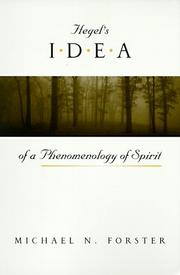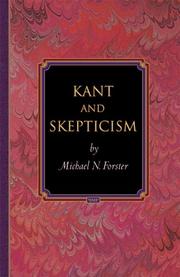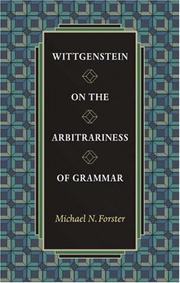| Listing 1 - 10 of 32 | << page >> |
Sort by
|

ISBN: 0226257428 0226257401 9780226257402 Year: 1998 Publisher: Chicago: University of Chicago press,
Abstract | Keywords | Export | Availability | Bookmark
 Loading...
Loading...Choose an application
- Reference Manager
- EndNote
- RefWorks (Direct export to RefWorks)

ISBN: 9780691129877 0691129878 Year: 2008 Volume: *3 Publisher: Princeton: Princeton university press,
Abstract | Keywords | Export | Availability | Bookmark
 Loading...
Loading...Choose an application
- Reference Manager
- EndNote
- RefWorks (Direct export to RefWorks)
Kant, Immanuel --- Skepticism. --- Kant, Immanuel, --- Skepticism --- Scepticism --- Unbelief --- Agnosticism --- Belief and doubt --- Free thought --- Kant, Emmanuel --- Kant, Emanuel --- Kant, Emanuele --- Kant, I. --- Kānt, ʻAmmānūʼīl, --- Kant, Immanouel, --- Kant, Immanuil, --- Kʻantʻŭ, --- Kant, --- Kant, Emmanuel, --- Ḳanṭ, ʻImanuʼel, --- Kant, E., --- Kant, Emanuel, --- Cantơ, I., --- Kant, Emanuele, --- Kant, Im. --- קאנט --- קאנט, א. --- קאנט, עמנואל --- קאנט, עמנואל, --- קאנט, ע. --- קנט --- קנט, עמנואל --- קנט, עמנואל, --- كانت ، ايمانوئل --- كنت، إمانويل، --- カントイマニユエル, --- Kangde, --- 康德, --- Kanṭ, Īmānwīl, --- كانط، إيمانويل --- Kant, Manuel,
Book
ISBN: 0674387074 Year: 1989 Publisher: London Cambridge, Mass Harvard University Press
Abstract | Keywords | Export | Availability | Bookmark
 Loading...
Loading...Choose an application
- Reference Manager
- EndNote
- RefWorks (Direct export to RefWorks)
Hegel, Georg Wilhelm Friedrich --- Views on skepticism --- Skepticism --- History --- 19th century
Book
ISBN: 9780199659388 0199659389 Year: 2012 Publisher: Oxford: Oxford university press,
Abstract | Keywords | Export | Availability | Bookmark
 Loading...
Loading...Choose an application
- Reference Manager
- EndNote
- RefWorks (Direct export to RefWorks)
Philosophy of language has for some time now been the very core of the discipline of philosophy. But where did it begin? Frege has sometimes been identified as its father, but in fact its origins lie much further back, in a tradition that arose in eighteenth-century Germany. Michael Forster explores that tradition. He also makes a case that the most important thinker within that tradition was J. G. Herder. It was Herder who established such fundamental principles in the philosophy of language as that thought essentially depends on language and that meaning consists in the usage of words. It was he who on that basis revolutionized the theory of interpretation ("hermeneutics") and the theory of translation. And it was he who played the pivotal role in founding such whole new disciplines concerned with language as anthropology and linguistics. In the course of developing these historical points, this book also shows that Herder and his tradition are in many ways superior to dominant trends in more recent philosophy of language: deeper in their principles and broader in their focus.
Language and languages --- Langage et langues --- Philosophy. --- Philosophie --- Herder, Johann Gottfried, --- Semantics --- Philosophy --- von Herder, Johann Gottfried, --- Language and languages - Philosophy --- von Herder, Johann Gottfried, - 1744-1803
Book
ISBN: 9780226257426 Year: 1998 Publisher: Chicago University of Chicago press
Abstract | Keywords | Export | Availability | Bookmark
 Loading...
Loading...Choose an application
- Reference Manager
- EndNote
- RefWorks (Direct export to RefWorks)
Book
ISBN: 9780199604814 Year: 2011 Publisher: New York, N.Y. Oxford University Press
Abstract | Keywords | Export | Availability | Bookmark
 Loading...
Loading...Choose an application
- Reference Manager
- EndNote
- RefWorks (Direct export to RefWorks)
German language --- Language and languages --- Foreign languages --- Languages --- Anthropology --- Communication --- Ethnology --- Information theory --- Meaning (Psychology) --- Philology --- Linguistics --- Ashkenazic German language --- Hochdeutsch --- Judaeo-German language (German) --- Judendeutsch language --- Judeo-German language (German) --- Jüdisch-Deutsch language --- Jüdischdeutsch language --- Germanic languages --- Philosophy&delete& --- History --- Philosophy --- Philosophy of language

ISBN: 1282157183 9786612157189 1400826047 9781400826049 9780691113661 0691113661 0691113661 0691123918 Year: 2004 Publisher: Princeton, N.J. Princeton University Press
Abstract | Keywords | Export | Availability | Bookmark
 Loading...
Loading...Choose an application
- Reference Manager
- EndNote
- RefWorks (Direct export to RefWorks)
What is the nature of a conceptual scheme? Are there alternative conceptual schemes? If so, are some more justifiable or correct than others? The later Wittgenstein already addresses these fundamental philosophical questions under the general rubric of "grammar" and the question of its "arbitrariness"--and does so with great subtlety. This book explores Wittgenstein's views on these questions. Part I interprets his conception of grammar as a generalized (and otherwise modified) version of Kant's transcendental idealist solution to a puzzle about necessity. It also seeks to reconcile Wittgenstein's seemingly inconsistent answers to the question of whether or not grammar is arbitrary by showing that he believed grammar to be arbitrary in one sense and non-arbitrary in another. Part II focuses on an especially central and contested feature of Wittgenstein's account: a thesis of the diversity of grammars. The author discusses this thesis in connection with the nature of formal logic, the limits of language, and the conditions of semantic understanding or access. Strongly argued and cleary written, this book will appeal not only to philosophers but also to students of the human sciences, for whom Wittgenstein's work holds great relevance.
Grammar, Comparative and general. --- Comparative grammar --- Grammar --- Grammar, Philosophical --- Grammar, Universal --- Language and languages --- Philosophical grammar --- Linguistics --- Philology --- Grammar, Comparative --- Wittgenstein, Ludwig, --- Grammar, Comparative and general --- Wei-tʻe-ken-ssu-tʻan, --- Wei-tʻe-ken-ssu-tʻan, Lu-te-wei-hsi, --- Wittgenstein, L. --- Vitgenshteĭn, L., --- Wei-ken-ssu-tʻan, --- Pitʻŭgensyutʻain, --- Vitgenshteĭn, Li︠u︡dvig, --- Weitegenshitan, --- Wittgenstein, Ludovicus, --- Vitgenshtaĭn, Ludvig, --- ויטגנשטיין, לודוויג --- 维特根斯坦, --- Wittgenstein, Ludwig Josef Johann,

ISBN: 1283069539 9786613069535 1400824400 9781400824403 9780691129877 0691129878 9780691146515 0691146519 Year: 2010 Publisher: Princeton, NJ
Abstract | Keywords | Export | Availability | Bookmark
 Loading...
Loading...Choose an application
- Reference Manager
- EndNote
- RefWorks (Direct export to RefWorks)
This book puts forward a much-needed reappraisal of Immanuel Kant's conception of and response to skepticism, as set forth principally in the Critique of Pure Reason. It is widely recognized that Kant's theoretical philosophy aims to answer skepticism and reform metaphysics--Michael Forster makes the controversial argument that those aims are closely linked. He distinguishes among three types of skepticism: "veil of perception" skepticism, which concerns the external world; Humean skepticism, which concerns the existence of a priori concepts and synthetic a priori knowledge; and Pyrrhonian skepticism, which concerns the equal balance of opposing arguments. Forster overturns conventional views by showing how the first of these types was of little importance for Kant, but how the second and third held very special importance for him, namely because of their bearing on the fate of metaphysics. He argues that Kant undertook his reform of metaphysics primarily in order to render it defensible against these types of skepticism. Finally, in a critical appraisal of Kant's project, Forster argues that, despite its strengths, it ultimately fails, for reasons that carry interesting broader philosophical lessons. These reasons include inadequate self-reflection and an underestimation of the resources of Pyrrhonian skepticism.
Skepticism. --- Scepticism --- Unbelief --- Agnosticism --- Belief and doubt --- Free thought --- Kant, Immanuel, --- Kant, Immanuel --- Kant, I. --- Kānt, ʻAmmānūʼīl, --- Kant, Immanouel, --- Kant, Immanuil, --- Kʻantʻŭ, --- Kant, --- Kant, Emmanuel, --- Ḳanṭ, ʻImanuʼel, --- Kant, E., --- Kant, Emanuel, --- Cantơ, I., --- Kant, Emanuele, --- Kant, Im. --- קאנט --- קאנט, א. --- קאנט, עמנואל --- קאנט, עמנואל, --- קאנט, ע. --- קנט --- קנט, עמנואל --- קנט, עמנואל, --- كانت ، ايمانوئل --- كنت، إمانويل، --- カントイマニユエル, --- Kangde, --- 康德, --- Kanṭ, Īmānwīl, --- كانط، إيمانويل --- Kant, Manuel,
Book
Year: 1989 Publisher: Cambridge (Mass.): Harvard university press
Abstract | Keywords | Export | Availability | Bookmark
 Loading...
Loading...Choose an application
- Reference Manager
- EndNote
- RefWorks (Direct export to RefWorks)
Book
ISBN: 9780674283855 Year: 2013 Publisher: Cambridge, MA
Abstract | Keywords | Export | Availability | Bookmark
 Loading...
Loading...Choose an application
- Reference Manager
- EndNote
- RefWorks (Direct export to RefWorks)
| Listing 1 - 10 of 32 | << page >> |
Sort by
|

 Search
Search Feedback
Feedback About UniCat
About UniCat  Help
Help News
News